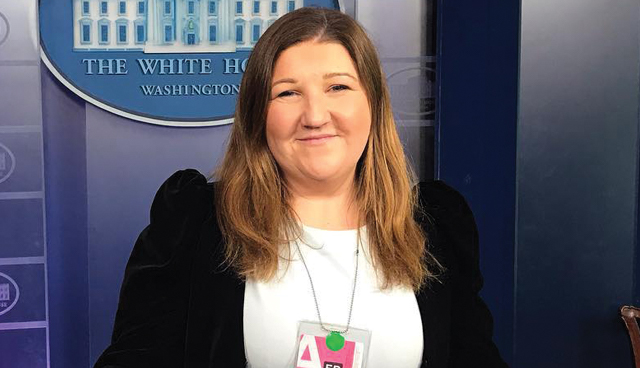Meet the Media: Christina Finn

Christina Finn is a political correspondent with TheJournal.ie. A graduate of University College Dublin and Dublin Institute of Technology, the Wicklow native previously worked as a reporter for the Metro Herald and Politico.ie among others.
How did you get into journalism?
I have always wanted to be a journalist, ever since I was a child. I wrote to all the newspaper editors when I was about 13 asking how to go about it. My first publication was a letter I sent into The Irish Times about asylum seekers, direct provision and racism in Ireland. It is interesting to see it is still a topic of discussion some 20 years later. On the back of advice from those in the profession, I ended up going to UCD to study arts, namely English and art history. I then went on to do a master’s in journalism in DIT. I graduated in 2008, around the time of the recession, so it was difficult to get my foot in the door, but I ended up working first in local news with The Wicklow Times. That is where I really got my love of politics, covering local council meetings. I also worked with Politico.ie, a politics website headed up by Malachy Browne, now of New York Times fame. After a few other stints in other publications, I ended up working as an intern with TheJournal.ie, before being made staff. I have been working there now close on nine years and was appointed Political Correspondent a number of years ago.
How do you think the profession is evolving?
I think journalism is in a difficult period at the moment and it has to adapt. Breaking news is our bread and butter in this 24-hour news cycle. There is added pressure on those in the industry to be the first with everything. Events are live streamed, press conferences are live tweeted and articles need to be pushed out on social media. Journalism, particularly digital journalism, has to give more offerings to its readers, with podcasts, video and deep dives into complicated topics. There is so much coming at people these days, and it is easy for facts to get lost in the noise, which is why it is important those facts are conveyed clearly in these times. TheJournal.ie does this through its FactChecks, which are hugely popular. I believe strongly that what must be at the heart of the profession is asking questions, difficult questions, not just taking something that someone in power says at face value.
What are the challenges of working for an online publication?
The challenge for newspapers is they only have so much space but working online that isn’t so much a problem. However, our editors are very discerning about what makes the cut, just like any other publication. I often feel that people think working online has different challenges than working in print, but at the end of the day, it is all reporting, it is all journalism. While we don’t have a print deadline, it does mean we are never ‘off’ as such. If something happens late, we need to get it up online. Most newspapers now are operating a ‘digital first’ policy also.
Who do you admire most within the industry and why?
The political team at The Irish Examiner are knocking it out of the park recently. Aoife-Grace Moore and Paul Hosford (formerly of TheJournal.ie parish) have been doing stellar work of late. Jennifer Bray of The Irish Times is one of the best, and Gavan Reilly (also formerly of TheJournal.ie) of Virgin Media News never fails to clearly explain even the most complicated political story. Of course, all my colleagues in TheJournal.ie, particularly Sean Murray, Nicky Ryan and Christine Bohan who are responsible for the award-winning Stardust Podcast, which is a great example of how publications are thinking outside the box and giving readers that something extra.
“I often feel that people think working online has different challenges than working in print, but at the end of the day, it is all reporting, it is all journalism.”
What has been your most significant story or project to date?
One of the standout stories for me was when Leo Varadkar, who was Taoiseach at the time, said Ireland had one of the lowest levels of homelessness, following questioning by me at a Fine Gael event. It was at a time when homeless figures were rising, and the fallout ended up rumbling on for nearly two weeks. The housing and homelessness crisis is an issue that I have kept up with, highlighting that the UN has been critical of the Irish Government on its policies. It is an issue that remains even in the midst of this pandemic.
How do you spend your time outside of work?
When I am trying to switch off from all the political happenings, I love to go for walks and hikes in places like Phoenix Park, Bray beach (where I am from) and Glendalough. I love meeting up for friends for dinner or drinks, and I love going to the cinema. During these pandemic times, I have taken up cycling. I was always too scared to cycle around the city before, but I love it now.





